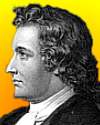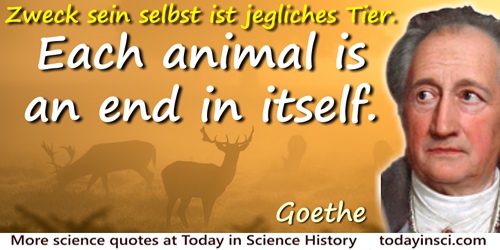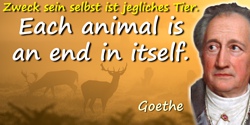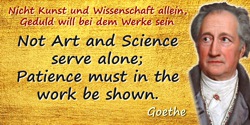 (source)
(source)
|
Johann Wolfgang von Goethe
(28 Aug 1749 - 22 Mar 1832)
German poet, zoologist, botanist and geologist who an intellectual with an interest writing on science, but was primarily famous for poetry and literature.
|
Johann Wolfgang von Goethe Quotes on Nature (28 quotes)
>> Click for 137 Science Quotes by Johann Wolfgang von Goethe
>> Click for Johann Wolfgang von Goethe Quotes on | Evolution | Science And Art |
>> Click for 137 Science Quotes by Johann Wolfgang von Goethe
>> Click for Johann Wolfgang von Goethe Quotes on | Evolution | Science And Art |
[Nature] is complete, but never finished.
— Johann Wolfgang von Goethe
As quoted by T.H. Huxley, in Norman Lockyer (ed.), 'Nature: Aphorisms by Goethe', Nature (1870), 1, 10.
Zweck sein selbst ist jegliches Tier.
Each animal is an end in itself.
Each animal is an end in itself.
— Johann Wolfgang von Goethe
'Metamorphose der Tiere' (1806), in David Luke (ed.), Goethe (1964), 152.
Here I am at the limit which God and nature has assigned to my individuality. I am compelled to depend upon word, language and image in the most precise sense, and am wholly unable to operate in any manner whatever with symbols and numbers which are easily intelligible to the most highly gifted minds.
— Johann Wolfgang von Goethe
In Letter to Naumann (1826), in Vogel, Goethe's Selbstzeugnisse (1903), 56.
In Nature we never see anything isolated, but everything in connection with something else which is before it, beside it, under it, and over it.
— Johann Wolfgang von Goethe
In James Wood, Dictionary of Quotations from Ancient and Modern, English and Foreign Sources (1893), 183:24.
In the sphere of natural science let us remember that we have always to deal with an insoluble problem. Let us prove keen and honest in attending to anything which is in any way brought to our notice, most of all when it does not fit in with our previous ideas. For it is only thereby that we perceive the problem, which does indeed lie in nature, but still more in man.
— Johann Wolfgang von Goethe
In The Maxims and Reflections of Goethe (1906), 183.
It is always, our eyes alone, our way of looking at things. Nature alone knows what she means now, and what she had meant in the past.
— Johann Wolfgang von Goethe
In The Maxims and Reflections of Goethe (1906), 203.
It will be! the mass is working clearer!
Conviction gathers, truer, nearer!
The mystery which for Man in Nature lies
We dare to test, by knowledge led;
And that which she was wont to organize
We crystallize, instead.
Conviction gathers, truer, nearer!
The mystery which for Man in Nature lies
We dare to test, by knowledge led;
And that which she was wont to organize
We crystallize, instead.
— Johann Wolfgang von Goethe
As spoken by character Wagner, in Johann Goethe and Bayard Taylr (trans.), Faust: A tragedy by Johann Wolfgang von Goethe, translated, in the original metres: The Second Part (1871), Act 2, Scene 2, Laboratory, 119.
Nature does not suffer her veil to be taken from her, and what she does not choose to reveal to the spirit, thou wilt not wrest from her by levers and screws.
— Johann Wolfgang von Goethe
In James Wood, Dictionary of Quotations from Ancient and Modern, English and Foreign Sources (1893), 119:29.
Nature goes her own way, and all that to us seems an exception is really according to order.
— Johann Wolfgang von Goethe
Thurs 9 Dec 1824. Johann Peter Eckermann, Conversations with Goethe, ed. J. K. Moorhead and trans. J. Oxenford (1971), 75.
Nature is beneficent. I praise her and all her works. She is silent and wise. … She is cunning, but for good ends. … She has brought me here and will also lead me away. I trust her. She may scold me, but she will not hate her work.
— Johann Wolfgang von Goethe
As quoted by T.H. Huxley, in Norman Lockyer (ed.), 'Nature: Aphorisms by Goethe', Nature (1870), 1, 10.
Nature! … Each of her works has an essence of its own; each of her phenomena a special characterisation: and yet their diversity is in unity.
— Johann Wolfgang von Goethe
As quoted by T.H. Huxley, in Norman Lockyer (ed.), 'Nature: Aphorisms by Goethe', Nature (1870), 1, 10.
Nature! … Incessant life, development, and movement are in her, but she advances not. She changes for ever and ever, and rests not a moment. Quietude is inconceivable to her, and she has laid her curse upon rest. She is firm. Her steps are measured, her exceptions rare, her laws unchangeable.
— Johann Wolfgang von Goethe
As quoted by T.H. Huxley, in Norman Lockyer (ed.), 'Nature: Aphorisms by Goethe', Nature (1870), 1, 9.
Nature! … She creates needs because she loves action. Wondrous! that she produces all this action so easily. Every need is a benefit, swiftly satisfied, swiftly renewed.—Every fresh want is a new source of pleasure, but she soon reaches an equilibrium.
— Johann Wolfgang von Goethe
As quoted by T.H. Huxley, in Norman Lockyer (ed.), 'Nature: Aphorisms by Goethe', Nature (1870), 1, 10.
Nature! … She is always building up and destroying; but her workshop is inaccessible.
— Johann Wolfgang von Goethe
As quoted by T.H. Huxley, in Norman Lockyer (ed.), 'Nature: Aphorisms by Goethe', Nature (1870), 1, 10.
Nature! … She is ever shaping new forms: what is, has never yet been; what has been, comes not again. Everything is new, and yet nought but the old.
— Johann Wolfgang von Goethe
As quoted by T.H. Huxley, in Norman Lockyer (ed.), 'Nature: Aphorisms by Goethe', Nature (1870), 1, 9.
Nature! … She is the only artist; working-up the most uniform material into utter opposites; arriving, without a trace of effort, at perfection, at the most exact precision, though always veiled under a certain softness.
— Johann Wolfgang von Goethe
As quoted by T.H. Huxley, in Norman Lockyer (ed.), 'Nature: Aphorisms by Goethe', Nature (1870), 1, 10.
Nature! … She performs a play; we know not whether she sees it herself, and yet she acts for us, the lookers-on.
— Johann Wolfgang von Goethe
Jeremy Naydler (ed.), Goethe On Science: An Anthology of Goethe's Scientific Writings (1996), 60
Nature! … She tosses her creatures out of nothingness, and tells them not whence they came, nor whither they go. It is their business to run, she knows the road.
— Johann Wolfgang von Goethe
As quoted by T.H. Huxley, in Norman Lockyer (ed.), 'Nature: Aphorisms by Goethe', Nature (1870), 1, 9.
Nature! … The one thing she seems to aim at is Individuality; yet she cares nothing for individuals.
— Johann Wolfgang von Goethe
As quoted by T.H. Huxley, in Norman Lockyer (ed.), 'Nature: Aphorisms by Goethe', Nature (1870), 1, 9.
Nature! … The spectacle of Nature is always new, for she is always renewing the spectators. Life is her most exquisite invention; and death is her expert contrivance to get plenty of life.
— Johann Wolfgang von Goethe
As quoted by T.H. Huxley, in Norman Lockyer (ed.), 'Nature: Aphorisms by Goethe', Nature (1870), 1, 9.
Nature! … We live in her midst and know her not. She is incessantly speaking to us, but betrays not her secret. We constantly act upon her, and yet have no power over her.
— Johann Wolfgang von Goethe
As quoted by T.H. Huxley, in Norman Lockyer (ed.), 'Nature: Aphorisms by Goethe', Nature (1870), 1, 9.
Nature! … We obey her laws even when we rebel against them; we work with her even when we desire to work against her.
— Johann Wolfgang von Goethe
As quoted by T.H. Huxley, in Norman Lockyer (ed.), 'Nature: Aphorisms by Goethe', Nature (1870), 1, 10.
Nothing is more consonant with Nature than that she puts into operation in the smallest detail that which she intends as a whole.
— Johann Wolfgang von Goethe
Jeremy Naydler (ed.), Goethe On Science: An Anthology of Goethe’s Scientific Writings (1996), 59.
Our mistake is that we doubt what is certain and want to establish what is uncertain. My maxim in the study of Nature is this: hold fast what is certain and keep a watch on what is uncertain.
— Johann Wolfgang von Goethe
In The Maxims and Reflections of Goethe (1906), 196.
Science helps us before all things in this, that it somewhat lightens the feeling of wonder with which Nature fills us; then, however, as life becomes more and more complex, it creates new facilities for the avoidance of what would do us harm and the promotion of what will do us good.
— Johann Wolfgang von Goethe
In The Maxims and Reflections of Goethe (1906), 203.
The beautiful is a manifestation of secret laws of nature, which but for this phenomenon would have remained hidden from us for ever.
— Johann Wolfgang von Goethe
Quoted in The Life of Goethe (1905), 101, citing Sprüche in Prosa, No. 197.
The Primal Plant is going be the strangest creature in the world, which Nature herself must envy me. With this model and the key to it, it will be possible to go on for ever inventing plants and know that their existence is logical; that is to say, if they do not actually exist, they could, for they are not the shadowy phantoms of a vain imagination, but possess an inner necessity and truth. The same law will be applicable to all other living organisms.
— Johann Wolfgang von Goethe
To Herder, 17 May 1787. Italian Journey (1816-17), trans. W. H. Auden and Elizabeth Mayer (1970), 310-11.
Whatever Nature undertakes, she can only accomplish it in a sequence. She never makes a leap. For example she could not produce a horse if it were not preceded by all the other animals on which she ascends to the horse’s structure as if on the rungs of a ladder. Thus every one thing exists for the sake of all things and all for the sake of one; for the one is of course the all as well. Nature, despite her seeming diversity, is always a unity, a whole; and thus, when she manifests herself in any part of that whole, the rest must serve as a basis for that particular manifestation, and the latter must have a relationship to the rest of the system.
— Johann Wolfgang von Goethe
Jeremy Naydler (ed.), Goethe On Science: An Anthology of Goethe's Scientific Writings (1996), 60
See also:
- 28 Aug - short biography, births, deaths and events on date of Goethe's birth.
- Goethe's Way of Science, by David Seamon. - book suggestion.




 In science it often happens that scientists say, 'You know that's a really good argument; my position is mistaken,' and then they would actually change their minds and you never hear that old view from them again. They really do it. It doesn't happen as often as it should, because scientists are human and change is sometimes painful. But it happens every day. I cannot recall the last time something like that happened in politics or religion.
(1987) --
In science it often happens that scientists say, 'You know that's a really good argument; my position is mistaken,' and then they would actually change their minds and you never hear that old view from them again. They really do it. It doesn't happen as often as it should, because scientists are human and change is sometimes painful. But it happens every day. I cannot recall the last time something like that happened in politics or religion.
(1987) -- 


